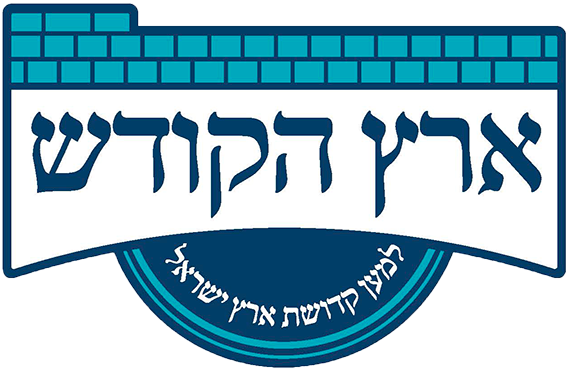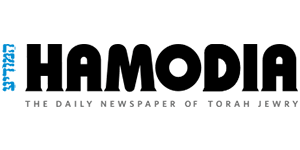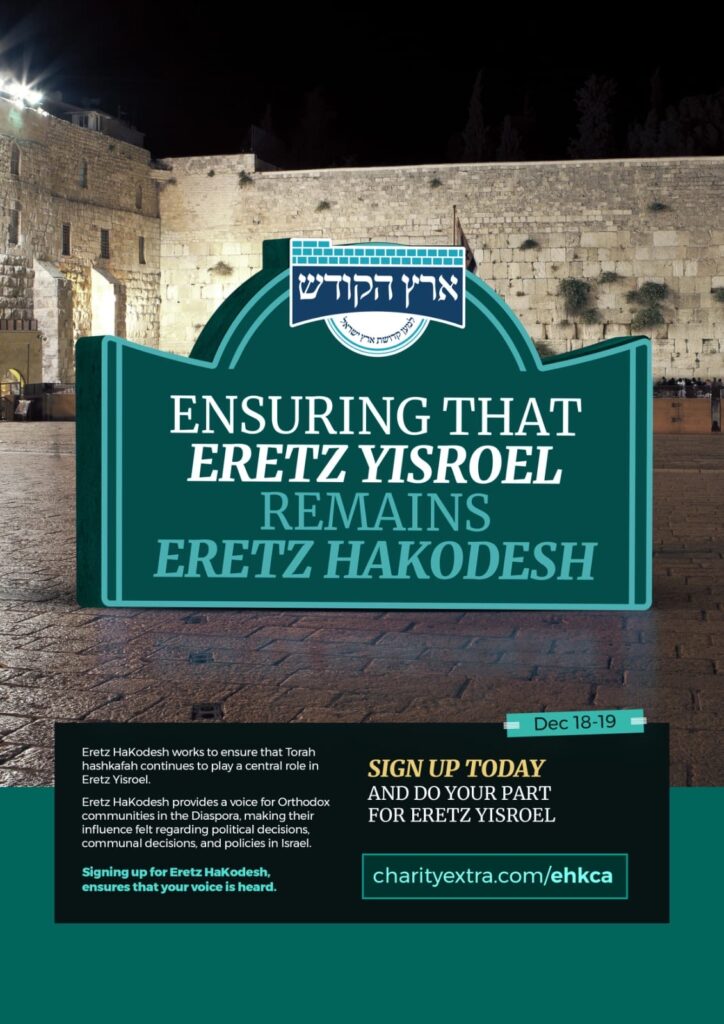When last week’s agreement dividing up portfolios within the World Zionist Organization (WZO) and its constituent bodies — Keren Hayesod, Keren Kayemet L’Yisrael, the Jewish National Fund, and the Jewish Agency — was finally signed, it was no easy slicing of the pie. Because for the first time, WZO’s decisive balance of power was now held by 25 US delegates on the Eretz HaKodesh slate, a first-time slate representing the American chareidi and right-wing modern Orthodox communities.
Most of the leading positions went to members of the right-wing and religious coalition, which prevailed in the election of delegates to the WZO concluding on March 11. The headline in the Jerusalem Post read: “Shift in power in WZO elections from progressive Left to religious Right.”
In the tense negotiations preceding the signing, the decisive balance of power was held by 25 US delegates on the Eretz HaKodesh slate, out of 521 delegates to the World Zionist Congress, which takes place every five years.
Under the terms of the agreement, Yosef Hagoel of Likud will take the reins of WZO executive and Avraham Duvdevani will head Keren Kayemet L’Yisrael. Both are shomer Shabbos Jews.
Eretz HaKodesh was largely the brainchild of Rabbi Pesach Lerner, the executive vice president emeritus of National Council of Young Israel and currently president of the Coalition of Jewish Values; the recent elections represent the culmination of two years of hard work. Mishpacha’s Yonoson Rosenblum spoke to Rabbi Lerner about the significance of last week’s signing.
YR: How big a deal was the participation of the new chareidi slate in the WZO elections? Do the election results justify all your efforts to bring Eretz HaKodesh into existence?
Rabbi Lerner: Sometimes, the best way to assess one’s impact is out of the mouths of one’s opponents. The Masorti Movement labeled the coalition negotiations “a hostile takeover of Zionist institutions.” And that theme was picked up by much of the Hebrew-language press. The Reform and Conservative movements moved heaven and earth to have the original coalition agreement rescinded. Heavy pressure was brought on organizations such as Hadassah and Bnei Brith, which have delegates to the World Zionist Congress, but traditionally do not participate in the coalition negotiations, to oppose the initial agreement.
As a result, some minor adjustments were made in the allocation of positions, but they were very slight. Eretz HaKodesh remains in charge of the education department of KKL for the next two and a half years, and a new department within the WZO for “chareidi spiritual services” was created.
During and after the elections, the Reform movement brought suit to the Supreme Court of the WZO to disqualify the Eretz HaKodesh slate as not properly Zionist. The suit was rejected, but the mere fact that it was brought shows how concerned those movements were by our participation.
YR: You mentioned some of the bodies and budgets that Eretz HaKodesh will control. Was the basis for your participation primarily in order to gain access to budgets?
Rabbi Lerner: The WZO and its affiliates control annual budgets of between $800 million and $1 billion. That’s a lot of money, and a lot of influence. And without being inside the organization, and especially on numerous internal committees and boards, as we will be, there is little way of fully understanding where that money is going.
But budgets were absolutely not our priority, or even close to the top of the list. The chief concern of the gedolim was to limit the influence of the liberal movements on the education of Jewish children. For example, under Israeli law, every schoolchild must receive some weekly instruction in Judaism. Because of the liberal movements’ dominant position in the WZO education department prior to this election, most of that education in Israeli schools was in Reform hands. Now, the Torah community will be in a position to influence that education.
A second major consequence of the WZO elections is that it will completely alter the perception in the eyes of Israeli policymakers and MKs of Diaspora Jewry, with immense consequences. For decades, the Reform and Conservative movements have claimed to represent Diaspora Jewry. That claim has now been exposed as empty. The Reform and Conservative movements poured enormous resources into very active campaigns, which is reflected in the 115% jump in turnout for the most recent WZO elections from the elections five years ago.
And yet, despite the ease of voting and minimal registration fee, they only managed to convince between two and three percent of their membership to vote. And remember, only 25% of non-Orthodox American Jews even belong to congregations. Most American Jews are not affiliated with anything. Chabad attracts more Shabbos worshippers than either the Reform or Conservative movements.
The heterodox movements always pressure Israeli politicians on such issues as the sanctity of the Kosel by insisting that Israel will completely alienate Diaspora Jewry unless it makes way for Women of the Wall, for instance. Yet despite making the Kosel and the “monopoly” of the Orthodox rabbinate the centerpiece of the Reform and Conservative campaigns, the response of non-Orthodox American Jewry was extremely limited.
A few years ago, a large mixed-seating area was created adjacent to the Kosel at great expense. Yet, on the fast of the 17th of Tammuz, the area was empty, as is almost always the case. The elections help explain why: Issues of the Kosel and the like may be important to the leadership of the heterodox movements, as a way to try to excite their congregants about something. But they aren’t.
The real tragedy is that the vast majority of American Jewry doesn’t care very much about Israel or its seven million fellow Jewish citizens. And that must be accounted as one of the great failures of the liberal movements: the failure to create any excitement about being Jewish, and the consequence is little support for Israel or identification with one’s fellow Jews.
When these movements speak about Israel, it is almost always against the views of the overwhelming majority of Jews actually living in Israel. They supported the Iran deal, oppose annexation of the Golan Heights, oppose Jewish settlement beyond the 1949 armistice lines, even in areas certain to remain in Israel in any peace deal, and even objected to the move of the American embassy to Jerusalem as not appropriate at this time.
Only the Orthodox stand with the citizens of Israel on all these issues and feel intimately connected to Israel: Our children almost all come to learn Torah in Israel after high school, and many will live in Israel for years or even permanently. One of the first and most successful registration drives organized by our Israeli representative Rabbi Nechemya Malinowitz was of young Americans studying in yeshivos and seminaries.
Chareidim contribute hundreds of millions of dollars to the Israeli economy annually as tourists, as donors to Israeli institutions, as parents of children living in Israel, and as purchasers of apartments. And they are major investors in the economy, as witnessed by the recent purchase of El Al by a chareidi businessman.
So the fact that a first-time chareidi delegate slate, with no organizational support, no office, no staff, and no budget, could place third among all the US slates, and with another 1,000 votes would have been second, attests to how concerned American chareidim are about what’s going on in Israel.
YR: When you speak about the importance of educating Israeli leaders and politicians about the true nature of Diaspora Jewry, you almost sound like the late Rabbi Moshe Sherer announcing the creation of Am Echad, which among other efforts also gave high-ranking Israeli leaders a firsthand and accurate portrayal of the American Orthodox perspective, demonstrating the Orthodox community’s unparalleled commitment to the State of Israel, its institutions, and its economy.
Rabbi Lerner: That’s not an accident. Rabbi Sherer, together with Rabbi Naftoli Neuberger of Ner Israel, was my mentor in many ways, and I view what I’m currently doing as a continuation of that original Am Echad delegation, which was Rabbi Sherer’s last public mission. I was on that delegation, and at the opening press conference, Rabbi Sherer pointed to me, as the chief executive of Young Israel, as proof that Am Echad was not just a synonym for Agudath Israel of America.
With greater visibility and as players on the Israeli scene, it will be much easier for our community to bring Israeli politicians to America to visit our communities and gain a feeling of how closely connected American Orthodox Jews are to Israel. Let them see the shuls packed at 6 a.m. with Jews learning daf yomi before work and again in the evening for another daf yomi shiur for balabatim after work. Let them experience how active and vibrant our communities are, and let them see our schools and Torah causes. And then let them visit a liberal temple for any sign of life during the week.
YR: You’re certainly right about the importance of such visits to Orthodox communities. The first thing I did after opening the Am Echad office in Jerusalem was to accompany first-term MK Yuval Steinitz to the United States for over a week. He has been a minister in almost every Israeli government since then, including finance minister. On that trip, he visited Lakewood, Ner Israel — which he described as reminding him of a “yeshivah kibbutz” — and Chaim Berlin. He had long private conversations with the Novominsker Rebbe, Rav Avrohom Pam, and Rav Neuberger, zichronam l’vrachah. And I remember how shocked he was by the number of people he met in shuls who were perfectly comfortable speaking with him in Hebrew.
Rabbi Lerner: Correct. It’s one thing for MKs to read the statistics showing that the future of American Jewry is Orthodox; it is something else entirely for them to witness the rapid growth and vibrancy of our communities firsthand.
YR: What were some of the biggest obstacles that Eretz HaKodesh had to overcome?
Rabbi Lerner: The first obstacle was the usual skepticism that a new project will succeed, or that it will be worth the effort if it does. But more fundamental was the long-standing ideological opposition of the Torah world to political Zionism. Most of the early Zionist leaders sought to create a “new Jew” and rejected Rav Saadia Gaon’s definition of the Jewish People as a nation by virtue of the Torah. While Zionism has long since ceased to be an ideological movement, the discomfort is deep-seated.
I want to make clear that nothing that we did was undertaken without the consultation and encouragement of gedolei Torah at the inception and at every step of the process, up to and including the recent coalition negotiations. As has been widely reported, Rav Chaim Kanievsky responded in writing to a letter from Rav Shmuel Kamenetsky that it was “Davar nachon la’asos. Kedai me’od l’hatzbia (It was the right thing to do, and very worthwhile to vote).”
Mishpacha, Hamodia, Yated Ne’eman, Ami, and numerous other national and regional media outlets, all accepted ads urging voting for Eretz HaKodesh, which, I assume, would not have happened had their rabbinic boards not received guidance from the gedolim.
Rabbi Nechemya Malinowitz, who represents Eretz HaKodesh in Israel, has a background in kiruv in Lev L’Achim, not in public affairs, and he has relied extensively on the experience and personal relationships of the leading chareidi activists, politicians, and public officials with the leading figures involved in negotiations, as well as for practical advice about how to conduct negotiations.
When the liberal movements sued us, our response was that we represent the “Zionism” of the talmidei HaGra and the Baal Shem Tov: love of Eretz Yisrael and concern with the physical and spiritual well-being of its Jewish residents. And that is precisely the message we want to convey to the Israeli public and policy makers. I have always found that precisely such expressions of caring can open up our fellow Jews to a new interest in our world. Im yirtzeh Hashem, with continued siyata d’Shmaya and guidance from the gedolim, we will be successful in our mission.
(Originally featured in Mishpacha, Issue 833)






